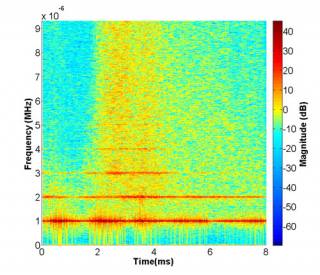
Cavitation signature from an ultrasound neurostimulatory pulse.
Neuro-stimulation has wide ranging clinical and research potential but this is currently limited either by low resolution, penetration or by highly invasive procedures. It has been reported in previous studies that ultrasound is able to elicit a neuro-stimulatory effect at a higher resolution than other non-invasive approaches but both the underlying mechanism that makes this possible and the practical details of how it can be implemented are still poorly understood.

Crab (Cancer Magister)
Our work in this area focuses on achieving a greater understanding of the ultrasound-nerve interaction, and the mechanisms by which stimulation can occur. We use an in vitro peripheral nerve bundle from a crab to demonstrate and investigate the neuro-stimulatory effect in a controlled e
nvironment. Early results from the nerve bundle show successful neurostimulation, indicating that structures in the peripheral nerve axon are sensitive to ultrasound.
Research in this area will help to identify novel applications and optimise the stimulation effect, informing the design of future procedures and devices used in in vivo applications.
This work is funded by a biomedical studentship from the UCL Grand Challenges of global health and human wellbeing.
Christopher Wright
 Close
Close

